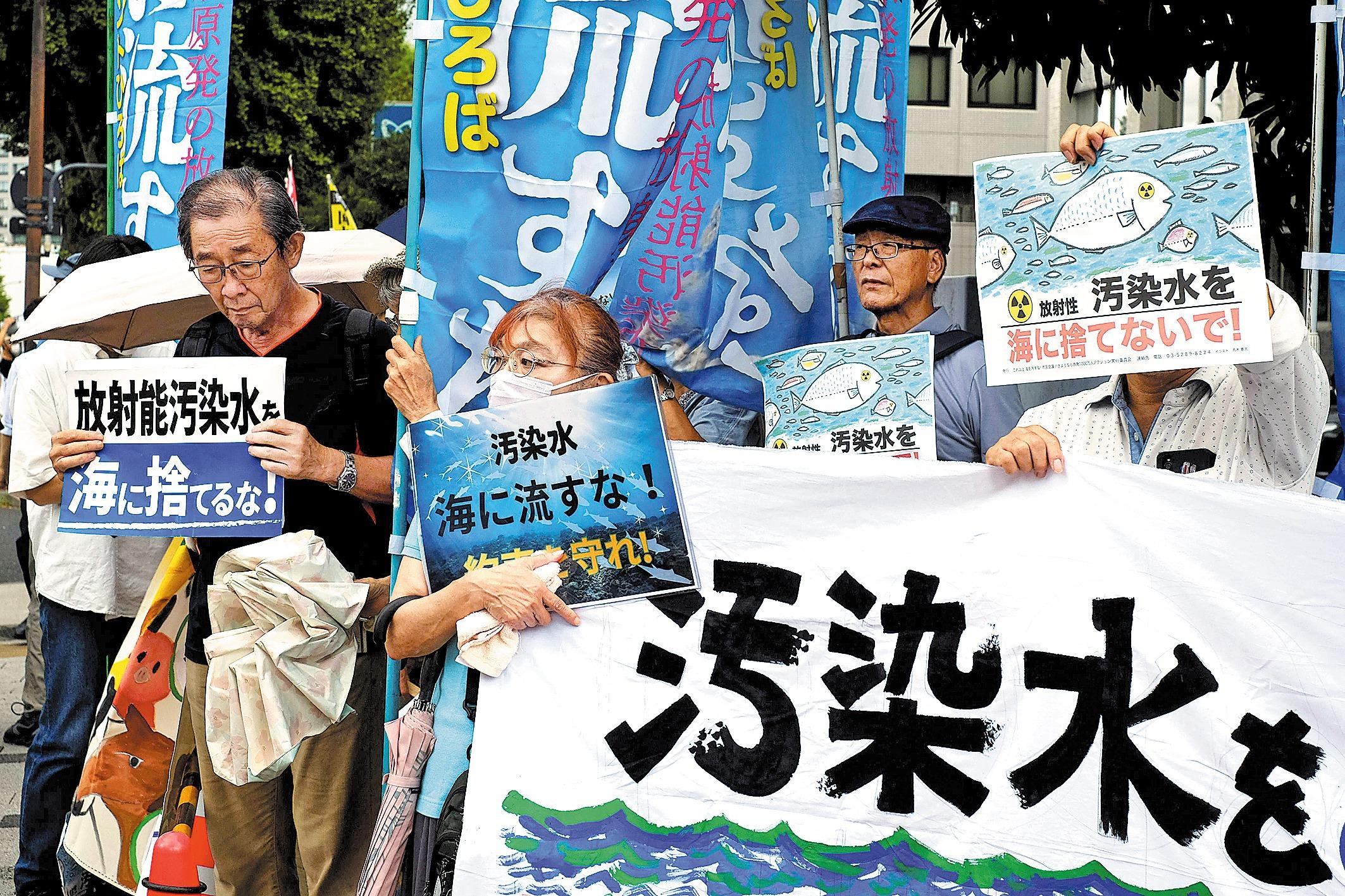Tokyo proceeds with ‘irresponsible’ release of Fukushima waste into sea
 Protesters gather on Aug 22 outside the prime minister’s office in Tokyo during a rally against the Japanese government’s plan to release radioactive water into the Pacific Ocean. (PHOTO / AFP)
Protesters gather on Aug 22 outside the prime minister’s office in Tokyo during a rally against the Japanese government’s plan to release radioactive water into the Pacific Ocean. (PHOTO / AFP)
Despite widespread criticism from the international community and domestically, Japan announced on Aug 22 that it would start releasing nuclear-contaminated water from the destroyed Fukushima Daiichi Nuclear Power Plant into the Pacific Ocean as early as Aug 24.
Japan started releasing nuclear-contaminated wastewater as planned on Aug 24. According to Tokyo Electric Power Company (TEPCO), the plant’s operator, the water discharge commenced at around 1:00 pm local time (0400 GMT). TEPCO plans to carry out the first round of release over 17 days to discharge 7,800 tons of the radioactive wastewater.
China voiced strong opposition after the announcement, saying that the act is extremely irresponsible.
On Aug 22, Vice-Foreign Minister Sun Weidong summoned Japanese Ambassador to China Hideo Tarumi and lodged solemn representations over the decision.
Sun said that Japan’s move disregards the strong concerns and firm opposition of the international community.
Condemning the decision as “extremely selfish and irresponsible”, Sun said that Japan is putting its own interests above the long-term well-being of the entire humanity. “China is gravely concerned and strongly opposed to this,” he said.
If Japan insists on the Pacific discharge, China will take all steps necessary to protect the ocean, ensure food safety and safeguard people’s life and health, he added.
Japanese Prime Minister Fumio Kishida gave the final go-ahead to the radioactive water discharge plan on Aug 22 and said the government will oversee the release of “treated water”, which he called “essential” for the safe decommissioning of the Fukushima plant.
A massive earthquake and tsunami on March 11, 2011, destroyed the Fukushima plant’s cooling systems, causing three of its reactors to melt and contaminate their cooling waters.
As the Kishida Cabinet cleared the plan, people from across the country staged a protest outside the prime minister’s office on Aug 22.
At a news briefing on Aug 22 in Beijing, Foreign Ministry spokesman Wang Wenbin said the legitimacy and safety of Japan’s ocean discharge plan have been questioned repeatedly over the past two years.
China strongly urges Japan to rectify its wrong decision, revoke the ocean discharge plan, and communicate with neighboring countries with sincerity and goodwill, he added.
Opposition parties and civic groups in South Korea also stepped up their efforts to press the Japanese government to immediately halt its plan.
Japan’s nuclear wastewater discharge is likely to be recorded as the second Pacific War in history,” said Lee Jae-myung, leader of the country’s main opposition Democratic Party, in Seoul.
During a meeting of the party’s supreme council at the National Assembly on Aug 23, Lee said Japan, which had threatened its neighbors’ right to survive in the past due to its imperialist war of aggression, is about to bring another irreversible disaster to the region.
Following Japan’s announcement, Park Ku-yeon, the first deputy chief of the Office for Government Policy Coordination, said the South Korean government saw no scientific or technical problems with the plan.
Chang Ma-ri, a climate energy campaigner for Greenpeace in Seoul, said flawed understanding of nuclear power plants was behind the South Korean government’s decision to accept Japan’s release plan.
“President Yoon Suk-yeol’s government did not fully examine the risks of the release plan … It will not be free from the judgment of the times,” said Chang, in a statement posted on Greenpeace’s website.
The Korean Confederation of Trade Unions said the discharge of the nuclear wastewater is the first price that South Korea has to pay for the trilateral meeting that was held on Aug 18 with the United States and Japan.
“The Yoon Suk-yeol government said it ‘neither approves nor opposes’ the plan,” the confederation said in a joint statement. “An accomplice in a crime will say the same. They are just conspiring with crime.”
On Aug 22, John Lee Ka-chiu, chief executive of China’s Hong Kong Special Administrative Region, announced an immediate ban on importing Japanese food products.
The Macao Special Administrative Region also announced a ban on the import of live and fresh food products from 10 prefectures and regions of Japan. The ban took effect on Aug 22.
Xi Tianqi and Prime Sarmiento in Hong Kong contributed to this story.
Contact the writers at jiangxueqing@chinadaily.com.cn


